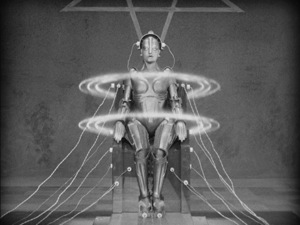I'm Just a Love Machine

Artifice and Consent in the Age of Robotics
The notion of robot love has a long history, and by far the dominant emphasis has been on its erotic manifestation. After all, the reasoning goes, a sufficiently advanced robot would offer all of the physical pleasure of a real partner with no emotional entanglements, personal judgments, or dissipating affections, in an un-aging body that can be sculpted to look exactly as one desires. Famous movie actors and actresses might even set up a lucrative side-business licensing their own bodily images to robot manufacturers, even long after time and nature had taken a toll.
In this scenario, physical beauty wouldn’t be the only attraction. A robotic lover would never say no, and would willingly embrace one’s darkest fantasies without revulsion. Curiosities, kinks, and perversions could be explored safely, without the potential to harm or exploit any other person.
Given all of this, it seems that sex with robots is almost over-determined. It’s a cliché to assert that sex is a prime driver of digital innovation, but that has certainly been true for many Internet-related technologies. It’s unclear how readily that would translate to robotics, but one indicator is the abundance of the “sex bot” trope (in both male and female forms) in popular fiction, from “Lucy LiuBot” in Futurama to “Gigolo Joe” in A.I..
Such scenarios remain, for now, deeply embedded in the world of fiction, but it’s not hard to imagine that we’re already halfway there. A quick visit to a present-day sex toy website will find hundreds of life-like devices, for both men and women, available for physical enjoyment (although it’s interesting to note that the vast majority of life-like sex toys are built for women, not men). For those customers with deeper pockets, full-size sex dolls, with internal articulated skeletons and life-like silicone bodies—and all necessary orifices and/or protuberances—can be had for around $5,000. Admittedly, these sexual tools are only marginally robot-like; at best, some offer limited motions, or make triggered noises. Sex bots that actively participate in the encounter remain fevered dreams.
Unsurprisingly, there are plenty of critics of the very idea of a sex robot. Most focus on sexualized gynoids in fiction, arguing (fairly convincingly) that most non-parody uses of female-appearing sex bots embody larger social biases about women’s roles. But some critiques attack the potential reality of sex bots, not just their use as metaphor. Here, the fears focus on the possible disruption to social norms arising from the availability of artificially “perfect” sexual partners.
At minimum, critics claim, the presence of sex bots would begin to alter expectations for how members of the appropriate sex would look and behave. This follows from similar arguments about how present-day popular culture shape desires, often through images manipulated to portray an almost inhuman level of attractiveness—only now, this once unattainable beauty has an entirely attainable physical form. Even more troubling for critics, sex bots are inherently willing to do whatever a person may want; real mates would never be as agreeable and as submissive to one’s desires as a machine you programmed yourself.
In these fearful scenarios, the appeal of human sexual partners can do nothing but wither in comparison to the lust-made-”flesh” of a sex bot. The inevitable result of people foregoing real relationships in favor of perfect (but non-reproducing) partners is, of course, the End of Civilization. It’s as if these critics see sex as the only driver for human relationships, and are all-too-ready to abandon any other form of intimate connection. Fortunately, there are strong drivers for bonding that go beyond physical coupling.
But even if the critics exaggerate the possibility of a “sex bot apocalypse,” there is a more subtle cultural complication that would arise along with LoveMakerBots. Our fundamental laws and norms around sex come down to consent: entities that are incapable of giving true consent are off-limits. A robot can be programmed to be constantly willing, but—absent the emergence of self-aware artificial intelligence—cannot be programmed to give true consent. This isn’t something many of us worry about when it comes to, say, vibrators, but when the design of the robot elicits an empathic, emotional reaction, intentionally or otherwise, an inability to give consent may for some move unexpectedly from irrelevant to deeply disturbing.
As the robotic devices we build trigger our emotional sensitivities in more and more complex ways, some of us will find it difficult to simply dismiss sex bots as nothing more than advanced models of sex toys. Sex play with a lifeless device is one thing; sex play with something that acts as if it has feelings (no matter how artificial), but inherently cannot say “no,” is quite another. And the more that these artificial feelings replicate and generate human responses, the more difficult this problem will become.
This is where we may see the first signs of a real dispute over the ethics of how robots will be treated. Sex bots offer a dilemma that overlaps issues of sexual norms, non-human rights, gender, technology’s social role, religion, even economics (for example: if inexpensive sex robots exist, what would happen to women who had been working as prostitutes for economic survival?); as such, it will be a conflict that will swiftly escalate in intensity and rancor.
Early debates on the treatment of robots may be driven, at least in part, by a sense of “wrongness” about the treatment of something that looks—and increasingly feels—human. What does it do to us, as humans, to treat something that looks and acts as if it is human in every important way as little more than a toy to be shoved under the bed? This argument may end up being the first shot in a larger battle over where autonomous devices fit in our society.
It’s an ironic scenario: the sex bot, conceived of as little more than a vibrator that talks, may end up being the catalyst for the fight for true robot rights.





